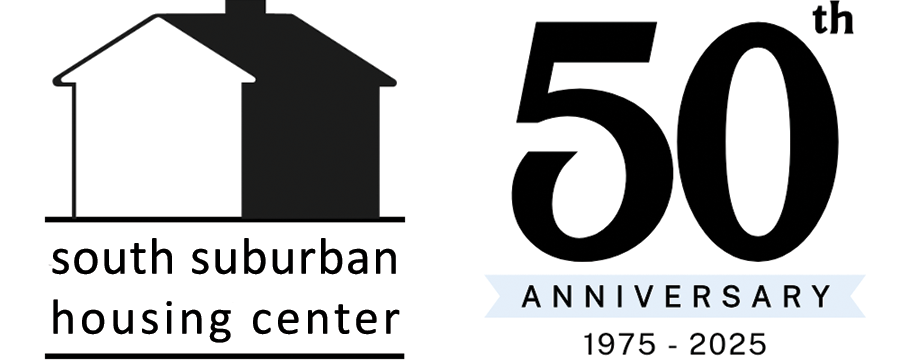Fair Housing Enforcement Investigations
South Suburban Housing Center has fought for housing justice in Chicago’s south suburbs since 1975. Through fair housing enforcement programming, we have filed notable complaints through federal, state, and local court systems to ensure that victims of fair housing law violations are made whole. Below are some of our recent cases with links to learn more.
Recent Cases and Investigations:
SSHC v. Pine Ridge Apartments
In December 2025, South Suburban Housing Center reached a settlement with the owners and management of Pine Ridge Apartments, a 224-unit apartment complex in Springfield, Illinois, resolving a complaint of housing discrimination based on source of income. The complaint was filed with the Illinois Department of Human Rights (IDHR) alleging source of income protected class violations covered by the Illinois Human Rights Act. SSHC’s investigation of Pine Ridge Apartments focused on gathering evidence of its policy of rejecting prospective tenants using Housing Choice Vouchers to help pay their rent. The settlement includes not discriminating on the basis of a tenant or applicant’s lawful source of income, including status as a Housing Choice Voucher holder, and to pay $6,000 in monetary damages and costs to SSHC.
Read the Press Release Here
View the Settlement Agreement Here
SSHC v. Twin Oaks West Apartments
November 2024, South Suburban Housing Center reached a settlement with the owners and management of Twin Oaks West Apartments, a 200-unit apartment complex in Joliet, resolving complaints of housing discrimination based on source of income and disability filed before the Illinois Department of Human Rights (IDHR). SSHC brought the complaints in 2023 after conducting a series of testing investigations into the housing provider’s practices for applicants using housing choice vouchers and tenants with disabilities requiring emotional support animals (ESAs). The private settlement includes $30,000 in monetary damages awarded to SSHC.
Read the Press Release Here
View the Settlement Agreement Here
$4 Million Settlement with Redfin
On April 29, 2022, Chicago area fair housing agencies South Suburban Housing Center, Open Communities, and HOPE Fair Housing Center joined the National Fair Housing Alliance (NFHA) and six other fair housing organizations from throughout the country in announcing a settlement of a federal court complaint with Redfin, one of the nation’s largest real estate services companies. Redfin’s elimination of its national minimum home price policy, expansion of real estate services for lower-priced homes in ten metropolitan areas, and payment of $4 million will settle a discrimination lawsuit. The settlement will expand opportunities for consumers in communities of color in Cook and DuPage counties of metropolitan Chicago.
Fannie Mae REO Case & Landmark Settlement
On February 7, 2022, South Suburban Housing Center along with the National Fair Housing Alliance (NFHA) and 19 other fair housing groups across the country, reached a landmark $53 million agreement with Fannie Mae (formally known as the Federal National Mortgage Association) to resolve a case arising from allegations that Fannie Mae treated foreclosed homes in communities of color unfavorably. The settlement will help rebuild and strengthen communities of color in 39 metropolitan areas including Chicago, IL and Gary, IN. In the case, plaintiffs alleged that Fannie Mae maintained and marketed its foreclosed homes in predominantly White neighborhoods while allowing similar homes in communities of color to fall into disrepair and that this differential treatment exacerbated the damage caused by the 2008 mortgage crisis and impeded recovery from the crisis in neighborhoods of color. The case was the first time a federal court confirmed the nation’s fair housing laws cover the maintenance and marketing of Real Estate Owned (REO) properties.
SSHC v. Dennis Kolios d/b/a Landmark Realty
This case involved a Fair Housing Act violation complaint filed in Federal District Court on November 11, 2019, alleging race discrimination against the owner and broker of a 6-unit apartment building in Orland Park, IL who refused to allow African Americans contacting him about advertised available apartments to set up viewing appointments.
SSHC vs. Barrios
SSHC joined two Chicago neighborhood organizations, Brighton Park Neighborhood Council and Logan Square Neighborhood Association, as plaintiffs in a 2018 lawsuit against County Assessor Joseph Berrios alleging racially and ethnically discriminatory and unfair residential property tax assessment practices that violate the Illinois Civil Rights Act, the Federal Fair Housing Act, and more.
Other REO Investigations
This lawsuit, filed in 2018 with the National Fair Housing Alliance and 18 other fair housing agencies, alleges that Bank of America, N.A., Bank of America Corp., and Safeguard Properties Management, LLC intentionally failed to provide routine exterior maintenance and marketing at Bank of America-owned homes in working- and middle-class African-American and Latino neighborhoods in 37 metropolitan areas, while they consistently maintained similar bank-owned homes in comparable white neighborhoods.
